Female Entrepreneurship | Female Stereotypes | Interview with Chris Gutlotta | Interview with Mary Roell
Female Entrepreneurship:The Pressure for Performance
Female entrepreneurship is more than a trendy pastime; it is the culmination of tireless work, the delicate balance of personal and business spheres, and the growing acceptance of women leaders. Over the past thirty years, Carlisle and the nation have witnessed an increase in the number of female business owners, and the number is on the rise. According to census data, “Between 1997 and 2002, Pennsylvania businesses owned by women grew by nearly 12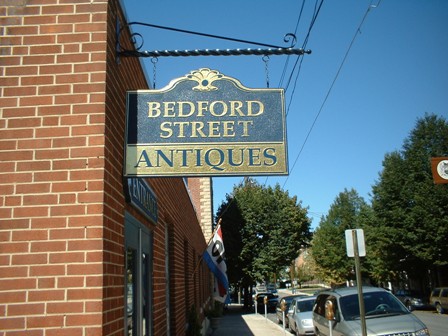 percent,” and the national rate of growth was significantly higher at 20 percent.[1] News article. Many challenges accompany the benefits of being a female entrepreneur. However, the benefits come at a cost, such as adhering to the pressures of a being a woman in a traditionally male dominated field. Since business has been a male dominated field in the past, some people have preconceived notions that men are more business savvy, creating unfair stereotypes. Owner of Bedford Street Antiques, Mary Roell understands the challenges and rewards of starting and maintaining a successful business. Female entrepreneurship challenges the stereotype and results in more productive and effective business owners.
percent,” and the national rate of growth was significantly higher at 20 percent.[1] News article. Many challenges accompany the benefits of being a female entrepreneur. However, the benefits come at a cost, such as adhering to the pressures of a being a woman in a traditionally male dominated field. Since business has been a male dominated field in the past, some people have preconceived notions that men are more business savvy, creating unfair stereotypes. Owner of Bedford Street Antiques, Mary Roell understands the challenges and rewards of starting and maintaining a successful business. Female entrepreneurship challenges the stereotype and results in more productive and effective business owners.
Starting a business requires institutional, community, and family support. Mary Roell had the desire and ambition to start her business, but needed the fin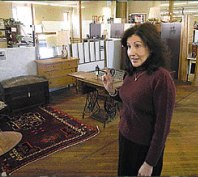 ancial backing to purchase and maintain her antique cooperative. Chris Gulotta, Executive Director of the Cumberland County Redevelopment Authority, assisted Mary Roell in securing the loans to fund her endeavor. In order to open a new business in Carlisle, Mary Roell needed the support from the community. Other antique dealers in town were welcoming and excited to have an addition to the downtown. In particular, Downtown Antiques owner, Don Warner commented on Bedford Street Antique’s arrival, “The more antique shops that come into the area means more business for all of us.”[2] News article. Adding another business to the tight-knit antique community benefits all of the stores. In addition to the other dealers, all of the businesses welcomed the antique co-op. Each store attracts more traffic and potentially increases the chances of purchases.
ancial backing to purchase and maintain her antique cooperative. Chris Gulotta, Executive Director of the Cumberland County Redevelopment Authority, assisted Mary Roell in securing the loans to fund her endeavor. In order to open a new business in Carlisle, Mary Roell needed the support from the community. Other antique dealers in town were welcoming and excited to have an addition to the downtown. In particular, Downtown Antiques owner, Don Warner commented on Bedford Street Antique’s arrival, “The more antique shops that come into the area means more business for all of us.”[2] News article. Adding another business to the tight-knit antique community benefits all of the stores. In addition to the other dealers, all of the businesses welcomed the antique co-op. Each store attracts more traffic and potentially increases the chances of purchases.
However, Mary Roell is not the first or last woman to create a business plan in C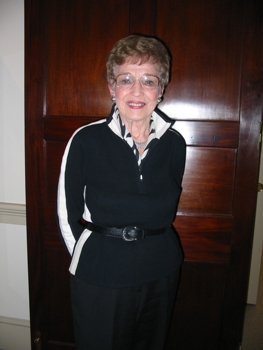 arlisle. Marguerite Grove-Harnish, pictured on the right, ran a successful dress shop that carried many fine products. She reminisces about the shop, “My store was a large store and we were ahead of our self at the time. We were more progressive than other stores. We handled dresses, coasts, lingerie, jewelry, and hats. Just about anything a lady would want.” Breaking out the private sphere, Ms. Grove-Harnish was one of the pioneering businesswomen of her time. Still active in the Carlisle community, she is able to see the plethora of female owned businesses today.
arlisle. Marguerite Grove-Harnish, pictured on the right, ran a successful dress shop that carried many fine products. She reminisces about the shop, “My store was a large store and we were ahead of our self at the time. We were more progressive than other stores. We handled dresses, coasts, lingerie, jewelry, and hats. Just about anything a lady would want.” Breaking out the private sphere, Ms. Grove-Harnish was one of the pioneering businesswomen of her time. Still active in the Carlisle community, she is able to see the plethora of female owned businesses today.
When thinking about businesses in Carlisle, many people do not think of it in terms of gender. Speckled throughout the downtown community, there are plenty of other female owned businesses besides Bedford Street Antiques. The Pomfret Street corridor is home to several successful female owned businesses. I was interested to discover what came before…The book, Taverns of Cumberland County, Pennsylvania, 1750-1840 by Merri Lou Schaumann, lists in details hundreds of taverns throughout the region. Carlisle was once home to 55 taverns, only 10 remain today. Many times, a woman either took over the tavern after her husband passed away or was willed the tavern.
Many of the women were owners for approximately a year, including:
1. Mary Faust, owner of Sign of the Bull’s Head, later known as The Globe in 1823. It was located on the southeast corner of High & West Streets.
2. Jane Grayson, owner of Sign of the King in 1811.
3. Catharine Weiser, owner of Sign of the Ship in 1800. The building still remains at 41 West Pomfret Street.
4. Dorothy Heigle, owner of Sign of the Black Bear in 1802, later known as the Pennsylvania Inn. It was located on the corner of Hanover & Louther Streets.
5. Margaret Shell, owner of Sign of the Buck in 1827. It was located on North Hanover Street.
6. Margaret McIntyre, owner of Sign of the Indian Queen in 1761. It was located on the northwest corner of High & East Streets.
A noteworthy and respectable woman, Elizabeth VanLear operated VanLear’s Tavern from 1794-1812. After her husband passed away, she was willed the tavern and ran one of the most successful taverns in Carlisle. One youth remembered, “Mrs. VanLear lived in a stone house now occupied by Miss Underwood. She sold molasses beer and ginger cakes which were in great demand in my younger days.”
Although not a complete list, here are several of the successful businesses owned by women in Carlisle:
17 North Hanover Street
249 -6285
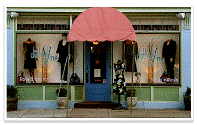 The Clothesvine
The Clothesvine
134 West High Street
249-7909
Fly Away Home
129 W. High Street
243-5318
Nancy Stamm’s Galleria
201 North Hanover Street
240-0551 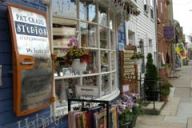
Pat Craig Studios
30 W. Pomfret Street
245-0382
All of the stores bring a unique flavor to Carlisle….take a look for yourself!!!
Challenges of Female Entrepreneurship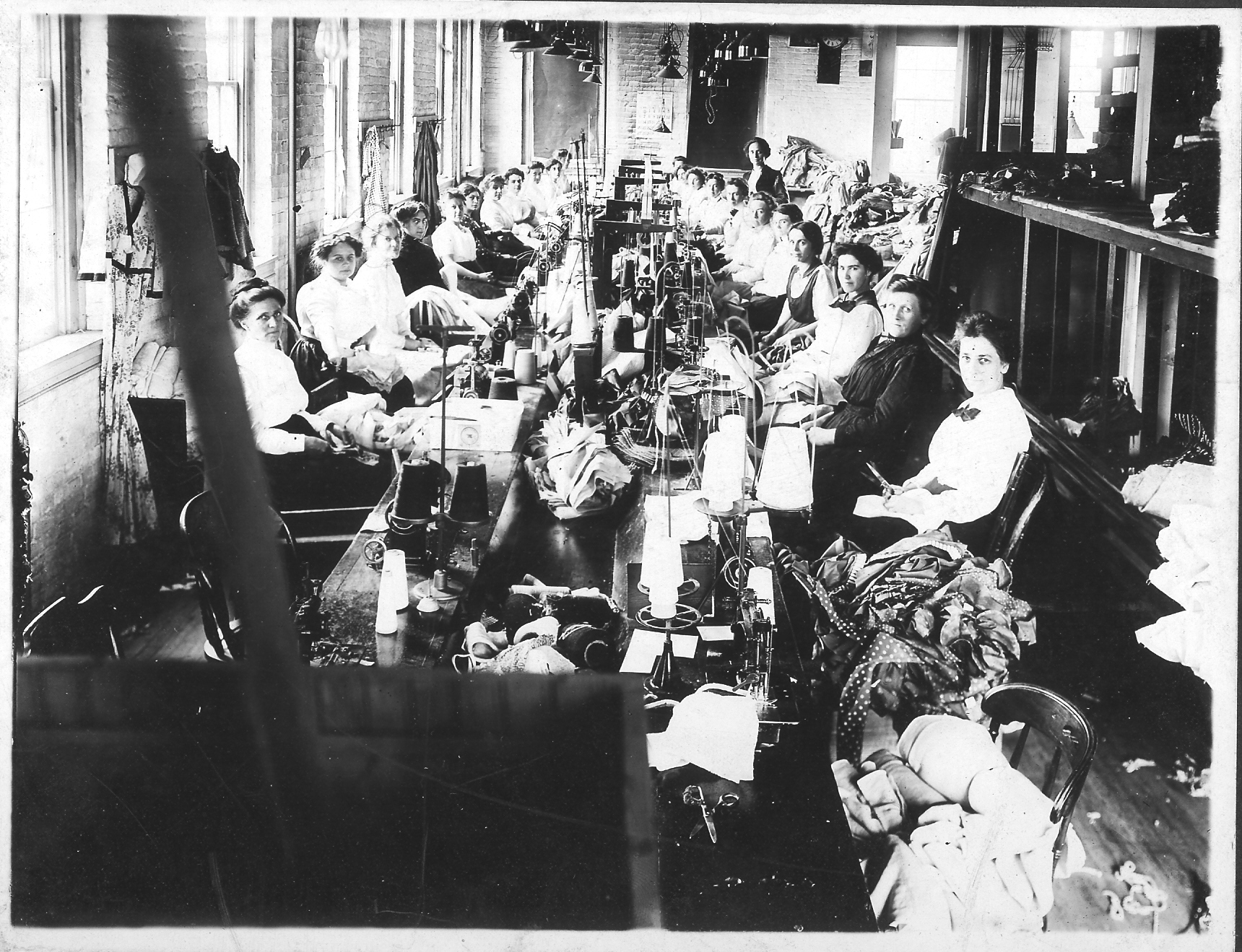
Although women have integrated themselves into the public sphere, it has not been a seamless transition for everyone, especially for mothers. The burden of the home still rests upon the female. Since the 1960s, women have moved into the business sphere, but have not lost their responsibilities in the private sphere. Many women feel overworked, and one working mother confesses, “I work all week to work all weekend cleaning, doing laundry and paperwork so that I can go back and work all week.”[3] The cyclical process of working to maintain a lifestyle is grueling and leaves women feeling empty. Without a caretaker available in the home, the family is pressed to find other domestic support systems, to cover necessities as important as childcare, cooking, and cleaning. 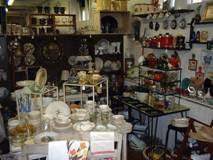 Luckily, Mary Roell is older and her children are grown, so they could assist her through the process. She acknowledged that the process would have been physically impossible without the help of family, friends, and employees. Mary’s personal and business spheres are in constant interaction and remain inseparable, like many women within the United States.The feminist movement precipitated and propelled women into the public sphere in record numbers. Of course, women have always worked in America, but they were not always acknowledged or treated as fairly as their male counterpart. Several laws assisted in creating an equal field for women. Mary Roell and Chris Gulotta both acknowledged the drastic change in business culture since the 1970s. Mary Roell noted a change in attitudes, while Chris Gulotta alluded to the structural change. Mary Roell commented on goals: [audio:mary-roell-quote-1.mp3]
Luckily, Mary Roell is older and her children are grown, so they could assist her through the process. She acknowledged that the process would have been physically impossible without the help of family, friends, and employees. Mary’s personal and business spheres are in constant interaction and remain inseparable, like many women within the United States.The feminist movement precipitated and propelled women into the public sphere in record numbers. Of course, women have always worked in America, but they were not always acknowledged or treated as fairly as their male counterpart. Several laws assisted in creating an equal field for women. Mary Roell and Chris Gulotta both acknowledged the drastic change in business culture since the 1970s. Mary Roell noted a change in attitudes, while Chris Gulotta alluded to the structural change. Mary Roell commented on goals: [audio:mary-roell-quote-1.mp3]
A lot of women, a lot of people, have dreams and they’re more willing to take a chance. I think people,or their husbands, are more supportive now than they would have been back in the ‘70s and I think that’s a big help.[4]Beliefs in oneself and marital support have shifted in Mary Roell’s eyes and have facilitated an increase in the number of female entrepreneurs. Conversely, Chris Gulotta credits guidance from institutions like the Cumberland County Redevelopment Authority. In the 1970s, business hopefuls would have had to look to the US Department of Housing and Urban Development for funding.[5] [audio:gulotta-quote-1.mp3]
People in positions like Chris alleviate some of the stress associated with the financial backing necessary for such large investments.
[1] Karla Browne, “Women Get Entrepreneurial Boosts,” The Sentinel, June 4, 2006.[2] Jennifer Kafkalas, “A Carlisle Rescue Mission,” The Sentinel, January 25, 2004.[3] Susan Thistle, From Marriage to the Market (California: University of California Press, 2006), 133.[4] Mary Roell interview[5] Chris Gulotta interview���
